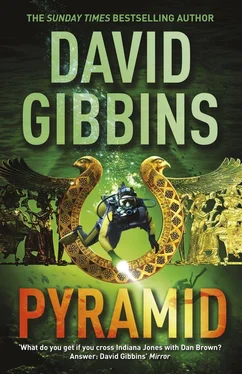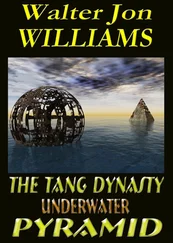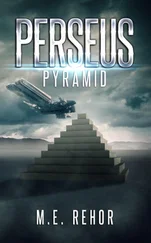“We have been coming across quite a few of these.” His English was accented but educated. “If they are being carried by Egyptians, we shoot them on the spot. You are the first Western imposters.”
“We’re not imposters,” Costas protested. “We’re journalists.”
“If you carry these false cards, you must have something to hide. You are spies.”
“We’re journalists. Read the accreditation.”
“You are spies.” The man was becoming heated. “Zionist spies.”
Jack thought quickly. The truth might be the best option. “Okay. A friend arranged the cards for us. We’re archaeologists, making our way back to Alexandria.”
“You are lying. You are Zionist pigs.”
“I’m Jack Howard, and this is Costas Kazantzakis. The antiquities director shouted my name in the square. We’re from the International Maritime University. Look us up online.”
“We have no use for the Internet.”
“Except to show videos of executions,” Costas muttered. “And burning pyramids.”
The man stared venomously at Costas, and then turned to Jack. “I will tell you why our forces are in Cairo.” He pointed to a poster on the glass partition, one that Jack had seen gunmen plaster on walls as they had come through the city. It showed an old black-and-white photo of a whitewashed tomblike structure, the Islamic crescent above it, with words in Arabic lettering below. The man continued: “A hundred and twenty years ago General Kitchener swore that he would avenge the death of General Gordon in Khartoum by killing an Arab for every hair on Gordon’s head. He had his vengeance at the Battle of Omdurman, but then he went too far. He desecrated the Mahdi’s tomb, tossing out the Sufi’s relics and parading his head in front of his men. When that happened we swore our own vengeance, and now we are having it. History has come back to haunt you, to haunt all who stand in our way.” He picked up the Glock and waved it at Costas. “Kneel, infidel.”
Costas remained impassive, and the man gestured again. One of the gunmen chewing khat came behind Costas and kicked him below the knees. He fell heavily but then pushed himself back up off the floor and knelt.
Jack felt paralyzed. “He’s Greek,” he said. “He couldn’t possibly be an Israeli spy.”
“Show me his papers then. No passport? Then he is a spy. You will watch him die, and then it will be your turn.”
He raised the Glock to Costas’ forehead and pulled the trigger. In that split-second Jack remembered that the Glock was security imprinted, that it recognized only Costas’ fingerprints. It was a manufacturer feature that Costas had wanted removed, but had not gotten around to doing. The man tried again, and again nothing. He threw it down in disgust. There was a sudden screaming in the corridor and a burst of gunfire, and the two gunmen who had been outside the door disappeared. Jack lunged forward, grabbed the Beretta off the desk, and fell backward, emptying all fifteen rounds into the three men in the room. The man on the desk crashed back against the glass partition with blood pumping from a hole in his throat, and the other two dropped instantly with multiple wounds to the chest and head. Jack scrambled up, ejected the magazine and loaded another from the two on the table, chambered a round, and shot the small man in the head. He put down the Beretta, picked up a knife from the slew of blood on the floor and quickly cut the tie between Costas’ wrists, and then held out his arms while Costas did the same for him. They both grabbed their pistols and spare magazines, dropped down together beside the doorway, and huddled out of view. The two gunmen who had been outside were sprawled motionless in the corridor in a pool of blood, and a ferocious gun battle was raging in the direction of their entrance from the lower floor.
“I know where we are,” Jack said, shouting above the noise. “It’s the Ministry of Culture. You can read it on the label on the desk. This is where they’re holding the girl Sahirah, and where Aysha’s cousin Ahmed was going to try to break her out. Chances are that’s what all this gunfire is about. He’s ex — Egyptian special forces, trained with the SAS, and knows what he’s doing. Now’s the time I would have chosen for an assault if I were in his shoes, while most of the focus among the gunmen is on the executions in that square.”
There was a sudden clatter of boots down the corridor and the sound of doors being kicked open, followed by bursts of gunfire. Seconds later two men in civilian clothes with Egyptian paratrooper M4 carbines rushed in, weapons levelled. Taking in the scene, they saw that Jack and Costas were still alive and aiming at them. Neither of the men was wearing the black headband of the gunmen, and both looked Egyptian. Jack dropped the Beretta and waved the press card at them. “CNN,” he shouted. “Journalists.”
Another man came in, glanced at them, and gestured to the others to lower their weapons. “Dr. Howard,” he said, crouching down. “Remember me? Aysha’s cousin Ahmed. We’re in here to find Sahirah.”
Jack raised himself as he picked up the Beretta. “Where’s Aysha?”
“I sent her on to the felucca. She’s gone with your friend the Sufi.”
Jack closed his eyes. Thank God for that . He helped Costas up, and then turned to Ahmed. “I can help you,” said Jack. “I’ve been in here before, when I came with Aysha’s husband to see the antiquities director. He made us wait for hours, and I went down to the archaeological conservation labs. Aysha told me that’s where they’re holding prisoners. The previous regime turned the labs into interrogation chambers. I can lead you there.”
“Okay,” said Ahmed. “We’ve cleared this corridor and the ground floor. There are probably still gunmen in the basement. But we don’t have much time. Someone will have reported back to the commanders in the square, and they’ll probably send a couple of truckloads of gunmen here. I came in with only five guys, and one’s already down.”
“What if there are other prisoners still alive?” Costas asked. “Sahirah was probably one of many.”
Ahmed shook his head. “We get her out first. Anyone else waits inside until we’re sure we’ve cleared the building. If there are many of them and we try to get them out together, it will be chaos and a massacre.”
Jack heaved Costas to his feet, grimacing from his wound, and then approached the door with the Beretta held ready. He glanced back at Ahmed. “You good to go?”
“On your six.”
Jack nodded, turned, and stepped cautiously into the corridor, peering left and right, and then made his way quickly to the stairway and down to the entrance foyer. Bodies were strewn everywhere, and Jack saw Ahmed’s other two men guarding the street entrance. He could orientate himself now and turned along a ground-floor corridor through a swinging door and down a flight of stairs to the basement level. The labs lay through two more doors ahead and were visible through the glass partition. He turned to the others, putting a finger up for quiet, and slowly opened each door in turn. He led them forward until they all stood silently in the corridor outside the labs. The walls were still covered with archaeological posters, one showing artifacts from the travelling Tutankhamun exhibition, the same poster that Hiebermeyer had in the institute in Alexandria. Another advertised a forthcoming conference on the Cairo Geniza, with a section of medieval manuscript text in Arabic prominently displayed beneath it.
Jack turned to the first of the labs and slowly raised himself until he could see through the glass partition that divided it from the corridor. The scene inside was like something from a horror film. The lights were off, but he could see a body strapped to a chair, with electrical wires attached to its hands. Another body was suspended from a hook that had once been used to raise heavy artifacts onto the lab bench. A terrible stench came through the cracks around the door as he passed it. Neither of the bodies had been a woman, and he turned back to Ahmed, who was crouched behind him, and shook his head. He moved forward to the next lab, crawled along to the door, and slowly raised himself up, holding out his hand for the others to wait. He was expecting the worst, but this one was different. The lights were on, bright florescent bulbs used for archaeological work, and he could see that the lab was filled with crouching people, perhaps twenty-five to thirty of them, their hands behind their heads and their faces down. Against the back wall were two gunmen with black headbands, chewing khat and fingering their Kalashnikovs, evidently left to guard these people while a decision was made about what to do with them.
Читать дальше












